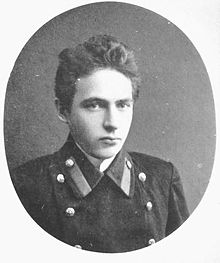Velimir Khlebnikov
Velimir Khlebnikov ( Russian Велимир Хлебников ; actually Viktor Vladimirovich Khlebnikov / Виктор Владимирович Хлебников , scientific. Transliteration Viktor Vladimirovič Khlebnikov ; born October 28 . Jul / 9. November 1885 greg. In Malyje Derbety , Governorate Astrakhan today Kalmykia ; † June 28 1922 in Santalowo , Krestzy Rajon , Novgorod Oblast ) was a poet of Russian Futurism , whose work and influence reached far beyond this movement.
Life
The subjects that Chlebnikow took during his studies - mathematics, natural sciences, Sanskrit and Slavic studies - only indicate the essential areas that were reflected in his work. His unusual personality aroused the highest respect, incomprehension, but also ridicule. He put no value on material possessions and mostly lived without a permanent residence. At times he lived in a clinic near Kharkov , where he received advice from the psychiatrist V. Ja. Anfimov was hoping for an opinion that would free him from service in the White Army . Khlebnikov died penniless in a provincial hospital.
meaning
Khlebnikov influenced Russian poetry like no other. He belonged to the important group of futurists Gileas (Гилея). Together with Vladimir Mayakovsky , Dawid Burljuk and Alexei Krutschonych he published the manifesto A slap in the face of general taste (Russian: "Пощечина общественному вкусу"), which is also considered the manifesto of Russian futurism.
His best-known works include Bobeobi (1908/09), Grasshopper (1908/09), Kolokol Uma (1913) and the so-called Über-Narration (сверхповесть) Sangesi . Together with Aleksei Krutschonych (text) and Mikhail Matjuschin (music), on decorations and costume designs by Kazimir Malevich , he was one of the authors of the “first futuristic opera” Victory over the Sun (Pobeda nad solnzem); a key work of the Russian and European avant-garde , premiered in Petersburg in December 1913.
In his work, Khlebnikov experimented with the Russian language. He went back to their roots and invented countless neologisms . Together with Krutschonych he developed the artificial language Zaum , which was to become a universal language , a star language or even a bird language. He was also fascinated by Slavic mythology and conceived a synthesis of the Eurasian spiritual world. He saw himself as the chairman of the globe, practiced a "science of fate" which he had placed in the border area between poetry and mathematics and which enabled him to predict the fall of the tsarist empire , the Second World War and the liberation of Africa from colonization .
At the documenta 8 in Kassel in 1987 , recordings of him were performed as an official contribution to the exhibition as part of the “Archeology of Acoustic Art 1 and 2: Radiofonia Futurista and Dada Music”.
gallery
v. r. n. l. top row: Nikolaj Burliuk, David Burliuk , Wladimir Majakowskij , bottom row: Chlebnikow, GL Kuzmin, SD Dolinskij (1912)
Sergei Jessenin , Anatoli Marienhof and Chlebnikow (right) (1920)
Vladimir Burlyuk : Portrait of Velemir Khlebnikov (1913)
Work (selection)
- Velimir Chlebnikov: works. Poetry - prose - writings - letters. Edited by Peter Urban . Rowohlt, Reinbek 1985, ISBN 3-498-00868-4 .
- Oskar Pastior , My Chlebnikov . Russian German. With audio CD. Engeler , Weil am Rhein 2003, ISBN 3-905591-70-7 .
- Valeri Scherstjanoi, Hartmut Andryczuk: Chlebnikov trilogy (Tiergarten; Zangesia; The Fall of Atlantis), texts, translations, drawings, scribes, audio CDs, videos; Berlin 2004–2006.
literature
- Valerij Gretchko: The bridle language of the Russian futurists. Projekt-Verlag, Bochum 1999, ISBN 3-89733-033-4 .
- Anke Niederbudde: Mathematical Conceptions in Russian Modernism: Florenskij - Chlebnikov - Charms Sagner, Munich 2006, ISBN 3-87690-930-9 . (Also: "What are and what are the numbers?" Numbers sets, arithmetic and counting in Florenskij, Chlebnikov and Charms. 2004 jfsl (PDF file; 264 kB))
- Bernhard Sames: Line of the avant-garde in Russia: transrational poetry in the "Akademija Zaumi". Kovač, Hamburg 2004, ISBN 3-8300-1285-3 .
- Peter Stobbe: Utopian thinking in V. Chlebnikov. Sagner, Munich 1982, ISBN 3-87690-243-6 .
Web links
- Literature by and about Velimir Chlebnikow in the catalog of the German National Library
- Works by and about Velimir Chlebnikow in the German Digital Library
Individual evidence
- ↑ See Wolfgang Kasack: Russian Authors in Individual Portraits. (= Universal Library. No. 9322). Reclam, Ditzingen 1994, ISBN 3-15-009322-8 , p. 97.
- ^ A b Adrian Wanner: Miniature Worlds - Russian prose poems from Turgenev to Charms; Chapter: Short biographies and notes (bilingual anthology) . Pano Verlag, Zurich 2004, ISBN 3-907576-73-X , p. 214 f .
- ↑ Selected Poems with Postscript, 1907–1914. In: World Digital Library . 1914, Retrieved September 28, 2013 .
| personal data | |
|---|---|
| SURNAME | Khlebnikov, Velimir |
| ALTERNATIVE NAMES | Хлебников, Велимир (Russian); Khlebnikov, Viktor Vladimirovich (real name); Хлебников, Виктор Владимирович (real name, Russian); Chlebnikov, Viktor Vladimirovič (real name, scientific transliteration) |
| BRIEF DESCRIPTION | Russian poet of futurism |
| DATE OF BIRTH | November 9, 1885 |
| PLACE OF BIRTH | Malyje Derbety |
| DATE OF DEATH | June 28, 1922 |
| Place of death | Santalowo |








